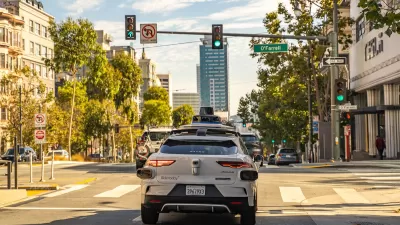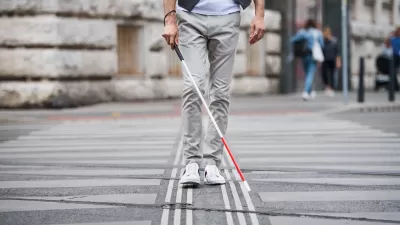Federal regulators are just starting to gain an understanding of how vehicles with automation systems impact traffic safety.

A federal report reveals a dearth of data about cars with advanced vehicle automation systems (ADAS), which “are involved in far more crashes than previously known,” writes Kea Wilson for Streetsblog.
“According to a new analysis from the National Highway Traffic Safety Administration, automakers reported 392 crashes in just 11 months among motorists who used “advanced driver assistance systems” within 30 seconds of an impact.” Until June 2021, automakers were not even required to report these crashes, and they are still not responsible for accounting for pedestrian safety.
“[T]he new trove of data raised particular questions about Tesla, which has become notorious for marketing itself as a path-breaking safety innovator despite a rash of high-profile crashes.” Wilson notes that almost 70 percent of ADAS involve Tesla vehicles.
“NHTSA announced last week that it’s expanding its investigation into Tesla’s misleadingly named ‘Autopilot’ and ‘Full Self Driving’ ‘advanced driver assistance’ systems to see whether they could be actually causing crashes by lulling drivers into a false sense of security behind the wheel of what they think are fully autonomous vehicles, but aren’t.” The article quotes Phil Koopman, an associate professor at Carnegie Mellon University, who suggests that the NHTSA “should be asking a lot more questions about the impact of ADAS on America’s traffic safety landscape” to understand how to effectively regulate the industry.
Comprehensively addressing autonomous vehicle safety, writes Wilson, “will require cities to think more deeply about designing safe roadway environments where no car is likely to kill.”
FULL STORY: Fed. AV Crash Report Underscores How Little We Know About Robocar Safety

Planetizen Federal Action Tracker
A weekly monitor of how Trump’s orders and actions are impacting planners and planning in America.

Map: Where Senate Republicans Want to Sell Your Public Lands
For public land advocates, the Senate Republicans’ proposal to sell millions of acres of public land in the West is “the biggest fight of their careers.”

Restaurant Patios Were a Pandemic Win — Why Were They so Hard to Keep?
Social distancing requirements and changes in travel patterns prompted cities to pilot new uses for street and sidewalk space. Then it got complicated.

Platform Pilsner: Vancouver Transit Agency Releases... a Beer?
TransLink will receive a portion of every sale of the four-pack.

Toronto Weighs Cheaper Transit, Parking Hikes for Major Events
Special event rates would take effect during large festivals, sports games and concerts to ‘discourage driving, manage congestion and free up space for transit.”

Berlin to Consider Car-Free Zone Larger Than Manhattan
The area bound by the 22-mile Ringbahn would still allow 12 uses of a private automobile per year per person, and several other exemptions.
Urban Design for Planners 1: Software Tools
This six-course series explores essential urban design concepts using open source software and equips planners with the tools they need to participate fully in the urban design process.
Planning for Universal Design
Learn the tools for implementing Universal Design in planning regulations.
Heyer Gruel & Associates PA
JM Goldson LLC
Custer County Colorado
City of Camden Redevelopment Agency
City of Astoria
Transportation Research & Education Center (TREC) at Portland State University
Camden Redevelopment Agency
City of Claremont
Municipality of Princeton (NJ)





























